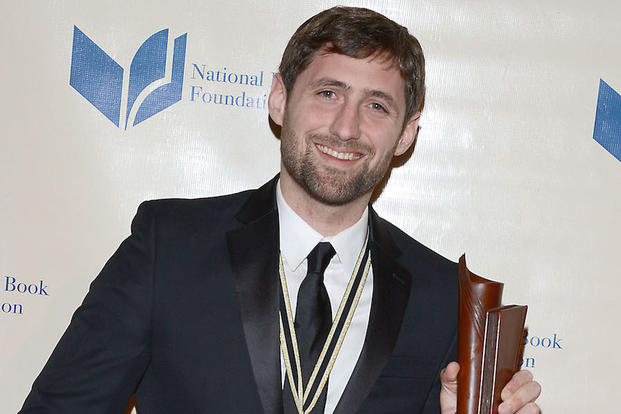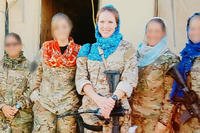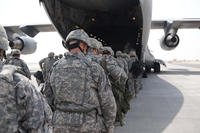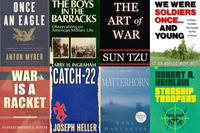The National Book Award prize for fiction came as a surprise to Phil Klay, who served as a Marine captain in Iraq, but not so much to two sergeants who worked for him in Anbar province.
Klay’s short story collection “Redeployment” could be described as a fictional take on what has been endlessly recounted in other forms as the problems U.S. troops faced in Iraq and the problems when they returned home. The two sergeants thought otherwise.
“We think Phil was trying to say something different,” Marine Sgt. Wayne Edmiston said of Klay’s 291-page work. “This is a glimpse of what we were doing over there” that could only be addressed in the fiction format, Edmiston said.
Klay said he never thought much of his chances for winning the National Book Award, given annually by the non-profit National Book Foundation in the categories of fiction, poetry, children’s books and non-fiction.
The awards are considered the most prestigious literary prizes given out in the U.S. Klay said he only scribbled out a few acceptance remarks for the Nov. 19 ceremony at his wife’s suggestion on the outside chance that “Redeployment” would be picked.
Klay also knew that winning the fiction award would put him in the heady company of such acclaimed previous winners as William Faulkner, Saul Bellow, Flannery O’Connor, Lillian Helman, Isaac Bashevis Singer, John Cheever and Norman Mailer.
The only other Marine who won the fiction prize was William Styron, who served stateside in World War II and Korea, for his searing novel “Sophie’s Choice” in 1980.
“Redeployment” was also up against formidable competition, including Marilynne Robinson’s novel “Lila.” Robinson’s work had been the subject of a lengthy profile in the New York Times magazine a few weeks before the awards ceremony.
However, the award judges called “Redeployment” a “brutal, piercing sometimes darkly funny collection that stakes Klay’s claim for consideration as the quintessential storyteller of America’s Iraq conflict.”
Dexter Filkins, who covered the war for the New York Times, simply called the book: “The best thing written so far on what the war did to people’s souls.”
Edmiston, 28, of Scranton, Pennsylvania, said he was not all that sure about the meaning of the book but called it an attempt to grapple with what he called the “different universes” inhabited by a military at war and a homefront that isn’t. Klay isn’t quite sure either.
“I came back not knowing what to think about so many things,” Klay said in a phone interview. “It’s a different war, a different military, a different country you’re coming back to. I guess I was trying to make sense of what America is when you come back to it. Definitely, there’s a disconnect,” he said.
In Iraq, Edmiston and Staff Sgt. Josh Hauser, 31, of Johnstown, Pennsylvania, said they would often catch Klay jotting furiously in a notebook after they’d been past the wire.
“He always had this green notebook with him,” Edmiston said. “I’d say ‘what are you doing?’ He’d say these stories are too good not to be written down.”
Klay would joke about it, saying it was weird for somebody whose main concern before joining the Marines “was which fraternity to rush” at Dartmouth to be gathering material for stories about war and its effects on those sent to it, Edmiston said.
“We knew he was a storyteller,” Hauser said. “Phil’s got such a talent for writing, and he’s got a talent for being able to share that with others. He saw how important it was to get across what each individual was going through. Then there’s the way he can put it on paper. Not easy.”
The two sergeants were combat correspondents and Klay was a public affairs officer who edited their stories. They were assigned to the 2nd Marine Logistics Group working out of Camp Taqqadum between Fallujah and Ramadi in Iraq’s Anbar province for 13 months in 2007 and 2008.
Klay made clear that “I was staff, I was not kicking down doors, I was not in combat” but his assignment gave him latitude to come into contact with a wide array of troops, contractors and Iraqi civilians, from the grunts and supply clerks to the rear echelon types obsessed with “metrics” and body counts.
His stories tell of the foreign service officer, convinced that starting a baseball team was the way to reach across the cultural divide with the Iraqis. Then there’s the story “Bodies” of the Marine who worked in Mortuary Affairs:
“For a long time I was angry. I didn’t want to talk about Iraq, so I wouldn’t tell anybody I’d been. And if people knew, if they pressed, I’d tell them lies.”
“There was this hajji corpse, ‘I’d say,’ lying in the sun. It’d been there for days. It was swollen with gases. The eyes were sockets. And we had to clean it off the streets.”
“Then I’d look at my audience and size them up, see if they wanted me to keep going. You’d be surprised how many do.”
Then there are the opening lines from “Redeployment,” the title story: “We shot dogs. Not by accident. We did it on purpose, and we called it Operation Scooby. I’m a dog person so I thought about that a lot.”
“First time was instinct. I hear O’Leary go ‘Jesus,’ and there’s a skinny brown dog lapping up blood the same way he’d lap up water from a bowl. It wasn’t American blood, but still, there’s that dog lapping it up. And that’s the last straw, I guess, and then it’s open season on dogs.”
Hauser, Edmiston and Klay came together as Marines in Anbar province for different reasons. Hauser said he had just turned 24 when he looked at his new baby daughter: “I had always thought about the military and I knew I just wanted to be able to tell her someday that I had served.”
For Edmiston, it was the terrorist attacks of Sept. 11, 2001: “We lived a two-hour drive from New York. It was important for me to do something.”
The 31-year-old Klay, who now lives in Brooklyn and writes full time, said he was raised with “a strong respect for the idea of service.” He has an older brother in the Marines and a younger one in the Army. His book is dedicated to “My mother and father, who had three sons, join the military in a time of war.”
In his acceptance speech at the awards ceremony, Klay did not dwell on the book so much as pose the questions that still haunt him from the writing of it:
“What do you do when you’re trying to find the words to explain to the father of a fallen Marine exactly what that Marine meant to you?
“What do you make of it when the middle-school students you’re teaching ask if you’ve ever killed anyone and are horribly disappointed when you say ‘No?’”
“What do you do when strangers at a bar insist on treating you as though you must be psychologically damaged just because you’re a veteran?”
“I don’t actually have the answers to those questions,” Klay said, but they must be explored. “I can’t think of a more important conversation to have,” Klay said. “War is too strange to be processed alone.”
-- Richard Sisk can be reached at Richard.Sisk@military.com






